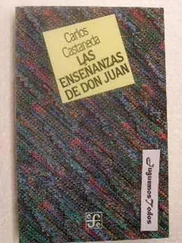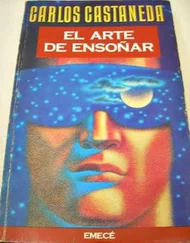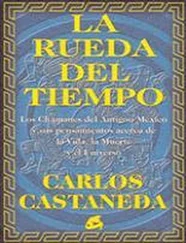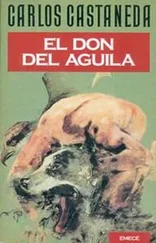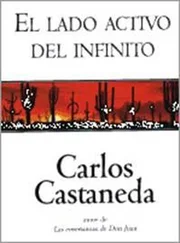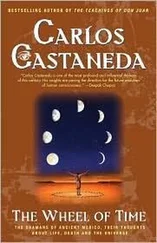He said that fears are natural; that all of us experience them and there is nothing we can do about it. But on the other hand, no matter how frightening learning is, it is more terrible to think of a man without an ally, or without knowledge.
In the more than two years that elapsed between the time don Juan decided to teach me about the ally powers and the time he thought I was ready to learn about them in the pragmatic, participatory form he considered as learning, he gradually defined the general features of the two allies in question. He prepared me for the indispensable corollary of all the verbalizations, and the consolidation of all the teachings, the states of non-ordinary reality.
At first he talked about the ally powers in a very casual manner. The first references I have in my notes are inteijected between other topics of conversation.
Wednesday, 23 August 1961
'The devil's weed [Jimson weed] was my benefactor's ally. It could have been mine also, but I didn't like her.'
'Why didn't you like the devil's weed, don Juan?'
'She has a serious drawback.'
'Is she inferior to other ally powers?'
'No. Don't get me wrong. She is as powerful as the best of allies, but there is something about her which I personally don't like.'
'Can you tell me what it is?'
'She distorts men. She gives them a taste of power too soon without fortifying their hearts and makes them domineering and unpredictable. She makes them weak in the middle of their great power.'
'Isn't there any way to avoid that?'
'There is a way to overcome it, but not to avoid it. Whoever becomes the weed's ally must pay that price.'
'How can one overcome that effect, don Juan?'
'The devil's weed has four heads: the root, the stem and leaves, the flowers, and the seeds. Each one of them is different, and whoever becomes her ally must learn about them in that order. The most important head is in the roots. The power of the devil's weed is conquered through the roots. The stem and leaves are the head that cures maladies; properly used, this head is a gift to mankind. The third head is in the flowers, and it is used to turn people crazy, or to make them obedient, or to kill them. The man whose ally is the weed never intakes the flowers, nor does he intake the stem and leaves, for that matter, except in cases of his own illness; but the roots and the seeds are always intaken; especially the seeds; they are the fourth head of the devil's weed and the most powerful of the four.
'My benefactor used to say the seeds are the «sober head» — the only part that could fortify the heart of man. The devil's weed is hard with her proteges, he used to say, because she aims to kill them fast, a thing she ordinarily accomplishes before they can arrive at the secrets of the «sober head». There are, however, tales about men who have unravelled the secrets of the sober head. What a challenge for a man of knowledge!'
'Did your benefactor unravel such secrets?'
'No, he didn't.'
'Have you met anyone who has done it?'
'No. But they lived at a time when that knowledge was important.'
'Do you know anyone who has met such men?'
'No, I don't.'
'Did your benefactor know anyone?'
'He did.'
'Why didn't he arrive at the secrets of the sober head?'
'To tame the devil's weed into an ally is one of the most difficult tasks I know. She never became one with me, for example, perhaps because I was never fond of her.'
'Can you still use her as an ally in spite of not being fond of her?'
'I can; nevertheless, I prefer not to. Maybe it will be different for you.'
'Why is it called the devil's weed?'
Don Juan made a gesture of indifference, shrugged his shoulders, and remained quiet for some time. Finally he said that 'devil's weed' was her temporary name |su nombre de leche]. He also said there were other names for the devil's weed, but they were not to be used, because the calling of a name was a serious matter, especially if one was learning to tame an ally power. I asked him why the calling of a name was so serious a matter. He said names were reserved to be used only when one was calling for help, in moments of great stress and need, and he assured me that such moments happen sooner or later in the life of whoever seeks knowledge.
Sunday, 3 September 1961
Today, during the afternoon, don Juan collected two Datura plants from the field.
Quite unexpectedly he brought the subject of the devil's weed into our conversation, and then asked me to go with him to the hills and look for one.
We drove to the nearby mountains. I got a shovel out of the trunk and walked into one of the canyons. We walked for quite a while, wading through the chaparral, which grew thick in the soft, sandy dirt. He stopped next to a small plant with dark— green leaves, and big, whitish, bell-shaped flowers.
'This one,' he said.
Immediately he started to shovel. I tried to help him but he refused with a strong shake of the head, and went on to dig a circular hole around the plant: a hole shaped like a cone, deep toward the outer edge and sloping into a mound in the centre of the circle. When he stopped digging he knelt close to the stem and with his fingers cleared the soft dirt around it, uncovering about four inches of a big, tuberous, forked root whose width contrasted markedly with the width of the stem, which was frail in comparison.
Don Juan looked at me and said the plant was a 'male' be— cause the root forked out from the exact point where it joined the stem. Then he stood up and started to walk away, looking for something.
'What are you looking for, don Juan?'
'I want to find a stick.'
I began to look around, hut he stopped me.
'Not you! You sit over there.' He pointed to some rocks twenty feet away. 'I will find it.'
He came back after a while with a long, dry branch. Using it as a digging stick, he loosened the dirt carefully along the two diverging branches of the root. He cleaned around them to a depth of approximately two feet. As he dug deeper the dirt became so hard-packed that it was practically impossible to penetrate it with the stick.
He came to a halt and sat down to catch his breath. I sat next to him. We did not talk for a long time.
'Why don't you dig it out with the shovel?' I asked.
'It could cut and injure the plant. I had to get a stick that belonged to this area so that, if I had struck the root, the injury wouldn't have bean as bad as one caused by a shovel or a foreign object.'
'What kind of a stick did you get?'
'Any dry branch of the paloverde tree would do. If there are no dry branches you have to cut a fresh one.'
'Can you use the branches of any other tree?'
'I told you, only paloverde and not any other.'
'Why is that so, don Juan?'
'Because the devil's weed has very few friends, and paloverde is the only tree in this area which agrees with her — the only thing that grabs or hooks onto it [lo unico que prende]. If you damage the root with a shovel she will not grow for you when you replant her, but if you injure her with such a stick, chances are the plant will not even feel it.'
'What are you going to do with the root now?
'I'm going to cut it. You must leave me. Go find another plant and wait until I call you.'
'Don't you want me to help you?' 'You may help me only if I ask you!'
I walked away and started to look for another plant in order to fight the strong desire to sneak around and watch him. After some time he joined me.
'Let us look for the female now,' he said.
'How do you tell them apart?'
'The female is taller and grows above the ground so it really looks like a small tree. The male is large and spreads out near the ground and looks more like a thick bush. Once we dig the female out you will see it has a single root going for quite a way before it becomes a fork. The male, on the other hand, has a forked root joined to the stem.'
Читать дальше




